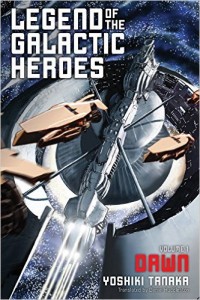By Yoshiki Tanaka. Released in Japan as “Ginga Eiyū Densetsu” by Tokuma Shoten. Released in North America by Haikasoru.
It’s rare to see a book that was first published in 1982 get so much excitement, but that’s exactly what happened when Viz’s SF imprint Haikasoru announced they had the first three volumes of this legendary series. The announcement was very much meant for old-school fans, those who are now in their early 40s and grew up with questionable translated fansubs of the 100-episode OAV that adapted the books (which has also recently been licensed). Why the excitement? Because it’s a really good story, showing off epic space battles and cool military tactics while at the same time showing us why constant warfare is something we should always strive to avoid. If the title sounds grandiose and over the top, it should. That’s what we’re going for here.
The first novel divides itself fairly equally between two sides of a long-running war. The Empire are a bunch of not-quite-Germans, whose lead character is Reinhard von Lohengramm, a young, handsome and brilliant tactician who is motivated by hatred and revenge after having his sister taken as mistress to the Emperor several years ago. Luckily, he has the standard sensible best friend with him, who occasionally reminds him to not go too far. On the side of the republic, we have Yang Wen-Li, who reminds me far too much of Tylor except that Yang came first. Yang desperately wants to be a historian and not get involved in the war at all, but sadly he’s an equally amazing military tactician, so he slides upwards through the book to full Admiral, mostly by virtue of being sensible, not lusting for glory and honor, and the occasional bout of clever genius.
The book begins with a long prologue showing how the Empire came to be, with the rise of Rudolf, a Hilter expy who shows off how much worse the Empire used to be. The sympathy of the Western reader, I admit, definitely resides with Yang over Reinhard, at least at the start. As the book goes on, though, and you see the very familiar corrupt democracy who think nothing of starting a war to get votes, you realize that neither side are really able to claim to be the good guys, and there are a bunch of inept generals and foolhardy glory hounds who show off the bad sides of both groups. Halfway through the book the Empire suffers a grievous military loss, and at the end an even worse political one. The Alliance shoots itself in the foot badly and is seen at the end licking its wounds. Even worse, there’s a hint that there are other parties trying to play both sides against the middle… led by the Church. (The Church, in stories like this, is almost always evil, unless it’s run by nuns.)
Haikasoru did a good job with the translation, I feel. It’s pompous and overly formal much of the time, but that’s exactly what the author is going for, I believe – much of the volume reads like a history book, and informality would miss the point. As I said earlier, the title is not just for show. This is not a light novel – it’s an epic legend, along the lines of Wagnerian opera. The anime, in fact, used a LOT of Mahler as the background music, which is highly fitting. If you enjoy military tactics books, as well as political infighting along the lines of Game of Thrones, then this is definitely the series for you. Haikasoru has promised two more volumes (the rest depends on sales) and I will absolutely be getting them.


This was my first time getting in the series, and I loved it. The epic historical feel the prose had was just fantastic, and the political intrigue really scratched an itch with me that other sci-fi series just haven’t been able to do. Good review as always!